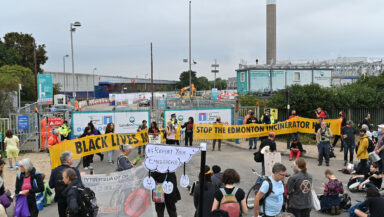Arriving at 7am, they barricaded the entrances with sick bay furniture and set up a diesel pollution clinic outside to offer advice and health checks to staff and members of the public.
Greenpeace is demanding Volkswagen commit to stop producing diesel cars and go 100% electric.
Mel Evans, clean air campaigner at Greenpeace, said:
“As the UK’s biggest seller of diesel cars, Volkswagen is complicit in an air pollution crisis that’s filling up emergency departments and GP surgeries.
“Volkswagen sold us a lie about diesel being clean. Its diesel addiction is seriously harming people’s health.
“Volkswagen won’t meet with us and won’t listen. So today we’ve brought the truth about diesel to its doorstep.
“Volkswagen must face up to its responsibility for deadly air pollution and commit to end diesel production now.”
Volkswagen sells the most diesel cars in the UK; one in five new diesel cars are VW Group.
More than two-thirds of people believe car companies, like Volkswagen, should be held to account for toxic diesel pollution and be made to contribute to a Clean Air Fund [1], according to a poll released by Greenpeace today. [2]
Aarash Saleh, 33, Doctor in respiratory medicine from Manchester, working in London, who is at the protest today, said:
“Diesel pollution is causing horrendous suffering across the UK and storing up a lifetime of troubled health for our kids. If you could see it, diesel would be banned tomorrow.”
The peaceful blockade at VW’s UK head office comes as concerns are growing about the health impacts of air pollution.
A recent study found an “absolutely clear” link between episodes of high air pollution and spikes in hospital admissions and visit to GPs.
The impact of air pollution is particularly acute for children. High exposure to polluted air at a young age can cause chronic health problems that last a lifetime, with research showing negative effects for lung function, respiratory issues like asthma and even stunted lung growth. [3]
Air pollution from cars and vans costs £6 billion in damage to health each year in the UK; equivalent to the entire budget of NHS Wales.
Levels of harmful nitrogen dioxide air pollution in the UK have broken legal limits every year since 2010 – and diesel vehicles are responsible for 90% of toxic NOx coming from roads.
In September 2017 Greenpeace launched the campaign targeting VW’s continued promotion of polluting diesel by blocking a major import route bringing Volkswagen diesel cars into the UK.
VW’s global competitors Toyota, Nissan, Volvo and Fiat-Chrysler are already reported to be ending diesel production in Europe.
Volkswagen was caught cheating on emissions tests by using a defeat device designed to reduce emissions in test conditions, but has faced no civil or criminal charges in the UK.
More than 1.2 million vehicles sold in the UK were fitted with this device by VW, designed to mislead the public and push cars which pump out dangerous levels of air pollution onto UK roads.
Volkswagen is now facing the largest group litigation action in UK history, brought by British consumers seeking compensation over the Dieselgate emissions scandal. Affected consumers are still able to join the suit before the 26 October deadline.
Ends/
For interviews on location, contact Graham Thompson, 07801 212 969
For further information and all other requests, contact: Ellen Booth on ellen.booth@greenpeace.org or 07732 072 791 or;
Greenpeace press office on press.uk@greenpeace.org or 020 7865 8255.
Photo and video available shortly from: https://media.greenpeace.org/collection/27MZIFJWTJHCE
Notes to editors:
[1] A joint inquiry by four committees of MPs recently recommended the UK car industry contribute to a new clean air fund, following the ‘polluter pays’ principle. If implemented, it would be the first policy to directly call car companies to account for the diesel pollution they produced.
[2] The poll of 2,010 demographically representative adults carried out by ComRes on behalf of Greenpeace in July asked the following question:
Thinking about the car industry’s role in reducing air pollution in the UK, to what extent do you agree or disagree with each of the following statements?
- The government should bring criminal charges against those in the car industry who misled customers about their air pollution their cars cause (70% agree, 14% disagree, 15% don’t know)
- The government needs to do more to hold the car industry to account for the rise in air pollution caused by diesel cars (70% agree, 16% disagree, 14% don’t know)
- A committee of MPs were right to have recently recommended that the UK car industry should be legally obliged to help pay for the costs of tackling air pollution caused by diesel cars, such as through a government-backed Clean Air Fund (68% agree, 14% disagree, 18% don’t know)
- Over one million Volkswagen customers affected by emission cheats in their cars deserve compensation (65% agree, 16% disagree, 18% don’t know)
- Sales of conventional diesel and petrol cars are currently planned to be banned by 2040, this should be bought forward to 2030 to match other nations (51% agree, 30% disagree, 18% don’t know)
- It is not the UK car industry’s responsibility to help pay for cleaning up air pollution caused by diesel cars (24% agree, 58% disagree, 18% don’t know)
[3] For further research on the links between air pollution and respiratory problems in children, see:
- Traffic-derived Air Pollution and Lung Function Growth
- Small Changes, Big Impact: Exposure to Air Pollution and Reduced Lung Function in Children
- Associations of short-term exposure to traffic-related air pollution with cardiovascular and respiratory hospital admissions in London, UK
- Suppression of lung growth by environmental toxins
- Air Pollution Exposure and Lung Function in Children: The ESCAPE Project



